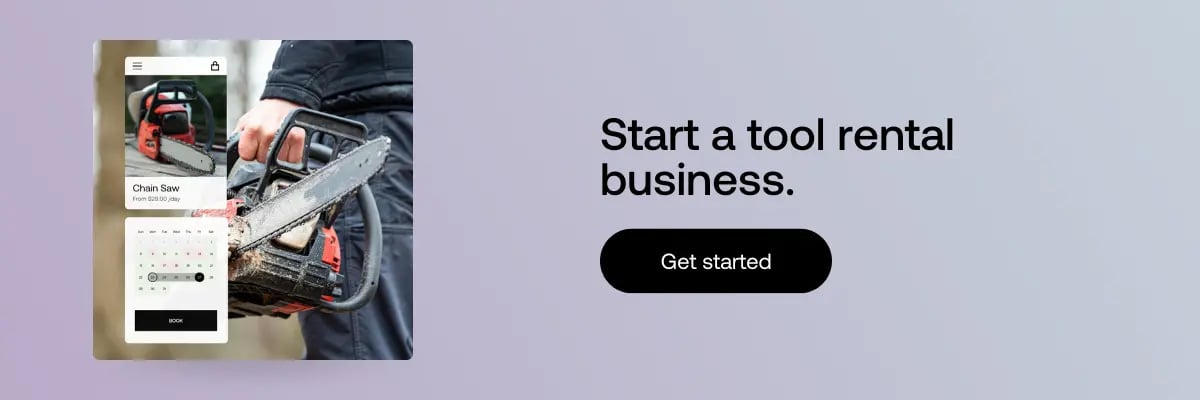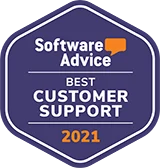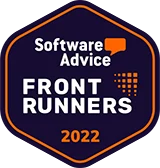As consumer behavior shifts away from long-term ownership and storage of infrequently used products, the popularity of short-term rentals is on the rise. This presents a unique opportunity to establish an equipment rental company and become a vital part of a more convenient and sustainable economy.
If you're looking to start your own tool rental business, there are a few essential steps you need to take. These steps will set you on the path to success and ensure that you have a solid foundation for your business. So, let's dive in and explore the key considerations for starting a tool rental business.
Create a tool rental business plan
A successful tool rental business starts with a solid plan. This stage involves a lot of research. It's the perfect time to determine if your business idea is viable.
Putting together an equipment rental inventory is a costly undertaking. Writing out an entire business plan also serves as a document for investors if you need extra capital. It also helps you get to grips with the financial realities of running a tool rental business.
To create a comprehensive tool rental business plan, it is important to consider the following key areas.
Market research and competitor analysis
The tool and equipment rental industry is thriving on a global scale, with a valuation of approximately $187 billion and a compound annual growth rate (CAGR) of 6%. This growth can be attributed to the continuous flow of commercial and residential construction projects. However, another significant factor contributing to this growth is the increasing consumer trend towards renting goods, including tools.
While market data can provide valuable insights, it is important not to rush into starting a business without a thorough understanding of your local market, target audience, and competitors in the equipment rental industry.
Here are a few key areas you need to consider before you start your tool rental business.
Identify your target audience
There are two primary audiences that you can target for a tool rental company. They are:
-
Contractors and construction workers: A construction equipment rental business can thrive in areas with many building projects.
-
Homeowners and DIY hobbyists: Residential customers are another big target audience. Home remodeling is growing in popularity, so this market has a lot of promise.
Once you've figured out who you'll serve, you must think about the right tools to stock. You can start small with a minimum viable inventory. However, renting out standard tools that most homeowners and contractors already own is unlikely to work. Offering expensive specialist rental equipment, such as floor sanders, concrete mixers, pneumatic drills, and so on, will more likely serve a gap in the market.
Perform a competitor analysis
Look at the other tool and equipment rental businesses in your area. Some of the things you need to know are:
-
What inventory do they carry?
-
What prices do they charge?
-
What are their strengths and weaknesses?
Understanding these businesses can help you find a gap in the market. Look for an angle, be it price, service, or the kind of equipment you offer.
Think about your area and what your local market needs. You can find a way to bring value to contractors or homeowners.
Evaluate the seasonality
A tool rental business is less subject to seasonality than other rental equipment services. However, depending on your niche or local weather, you may experience ups and downs. For example, if you focus on gardening or landscaping tools, demand can fluctuate with warmer weather.
However, as long as buildings are being built and renovated, your equipment rental company should have customers.
Business planning
Once you've done a market analysis, it's time to see where your business fits into the grand scheme of things.
Define your value proposition
Your value proposition helps you stand out against other equipment rental companies.
Think about your target audience. What are their pain points? Some of the issues you can solve could be price, convenience, or the quality of options on offer. Find a way to offer a valuable service to edge out the competition.
Describe your business model
Think about your business model. The big question to ask here is how you plan to generate revenue. Renting tools is a good start, but you can also sell nails, screws, and anything else related to the equipment you rent, such as sandpaper for sand floorers, etc.
That's why equipment rental is an excellent value-added service for hardware stores, providing a solution-oriented way to improve the customer experience. Indeed, for specific customer segments, equipment rental can increase sales of building materials. And professionals will buy the most essential tools for themselves anyway. We see nothing but profit in this.
You'll also need a good pricing strategy. You can offer flat day rates for each item. However, you can also consider bundles for tools frequently used together. Finally, you can offer discounts when renting equipment for longer rental periods.
Project your finances
Finances are essential to figuring out if your equipment rental company will work. Startup costs can be fairly high if you want to build an inventory of items people need to rent, which is why you need to plan your finances in advance.
Here are a few expenses that you need to consider.
-
Purchasing the initial stock of rental equipment
-
Downpayment for the commercial space to store and rent your products
-
Commercial vehicle
-
A company website and inventory management software
-
Accountancy and legal services
-
Licenses and permits
-
Marketing
-
Software and admin tools
-
Commercial vehicles for delivery and collection
Calculate these expenses. Inventory will be your most significant outgoing. However, you can start small with just a few tools and gradually expand. You'll need to offset these outgoings against your rental business income, so ensure the numbers increase.
Of course, there will be other ongoing expenses to think about, including:
-
Rent for your business premise
-
Utility bills
-
Phone and Internet contracts
-
Staff salaries
-
Business insurance
-
Tool maintenance and upkeep
-
Ongoing marketing spend
-
Credit card processing fees
Create a marketing plan
Once you understand your target audience, it's time to figure out how to reach them. A lot of this work will depend on the kinds of tools you want to rent.
Take the time to build a solid go-to-market strategy. Consider both on and offline marketing. If you have contacts in the construction industry, it could be time to use them. Also, consider establishing a presence in local construction or DIY forums. Use your expertise to help and answer questions, and you can establish trust.
Establish a legal entity for your tool rental business
There is a bit of admin involved in setting up a tool rental company. Here are a few things to consider.
Choose a name for your business
Pick a name that helps your business stand out and clarifies what you offer. Check these names against other local tool rental companies. Ensure you can get the social media handles and website names you want too.
Form a business entity
You have a few options when you want to form a business entity. But choose carefully because each structure has both tax and legal consequences. It's best to consult a legal professional before diving in.
Here are the three main options.
-
Sole Proprietorship: You can set up a sole proprietorship with just a social security number. However, there are a few downsides to consider. For starters, you'll get taxed on your business and personal income. Additionally, you'll be liable for any losses and damages which could affect your personal assets.
-
Partnership: Setting up a partnership can work if you have a business partner. These entities are similar to sole proprietorships but carry the additional risk of being responsible for your partner's actions.
-
LLC (Limited Liability Company): LLCs are a little more complex to set up, but they have two significant advantages: Your assets are protected from damages and losses, and you can avail of pass-through taxation.
Register for taxes
How you register for taxes largely depends on your local laws and regulations. If you're based in the US, you can apply for an Employer Identification Number (EIN). From there, you can register for state and federal taxes. Don't skip this step, or you'll run into problems down the line.
Set up a business bank account
It's highly recommended that you use a business bank account. If you commingle personal funds, it's challenging to calculate taxes or know how your business is doing. It also invalidates the liability protection you'll get from forming an LLC.
Another reason why you need a business bank account is that it will help you build credit, access loans, and get a company credit card. Cashflow is the number one small business killer. These facilities will give you a great chance of survival.
Legal and regulatory considerations
Permits, licenses, and insurance policies are further considerations for starting a new rental business.
Permits and licenses
The permits and licenses you need depend on where you start your business. Check the rules for your location or speak to a legal professional.
Insurance coverage
Some of the insurance policies you should consider are the following:
-
General liability: Covers property damage and bodily harm caused by your equipment while it's being used.
-
Worker's compensation: Protects your employees against injuries on the job.
-
Commercial vehicle insurance: Protects your vehicle if an accident or breakdown occurs.
-
Property insurance: Protects your inventory and business premises against damages.
Rental contract and waiver policies
You'll also need to draw up some rental contracts and waivers. Using power tools and construction equipment carries an element of risk. So you need to protect yourself against injuries and property damages that might occur.
Some popular agreements for tool rental businesses include:
-
Indemnity agreements to protect against injuries and property damages or legal action that occur from using your tools
-
While wear and tear are to be expected, you need to protect your inventory against negligence and misuse while being rented.
-
Clauses in the rental agreement allow you to seek damages or prosecution if the customer does not return your inventory on time.
Inventory management
Rental inventory management is crucial to smoothing the equipment rental business operations. You need to know which tools you have in stock and where your inventory is at all times.
In addition to tracking equipment, solid inventory management software is essential to improve inventory turnover, which is one of the most important factors impacting the profitability of a tool rental business.
Here are some steps to ensure your business runs smoothly.
Sourcing tools and equipment
As mentioned earlier, buying tools and equipment will make up the bulk of your startup costs. It's best to buy quality tools that will last long enough to return a profit. So, pick a niche and crack that first. Then, you can add more equipment as you go.
Tips for maintaining and organizing inventory
You should schedule regular checks and routine maintenance for each tool to ensure they remain in top working condition. This includes checking for wear and tear, functionality, and any electrical or mechanical issues. Using an inventory management system or software to track your tool inventory and its usage is invaluable for monitoring maintenance schedules and identifying patterns in tool rentals.
Moreover, you should develop an organized storage system that allows you to locate and access tools, streamlining the rental process. Cleanliness and tidiness are about improving operational efficiency and ensuring safety on the job site.
By emphasizing inventory management, you can offer a consistent and dependable service to your clients while minimizing downtime and maximizing the usage and lifespan of your tools. In the tool rental business, that's money.
Marketing and customer acquisition
Marketing and customer acquisition have never been more important or competitive. Here are some key areas to consider.
Identifying your target market
You should identify your target market during your business plan. But figuring out how to reach that audience is a job for marketing. So think about the places where you'll find your market. Social media platforms are great for finding and connecting with the right people. Many of these platforms offer cost-effective targeted ads too.
If you have a physical premise, focus on local SEO. In today's digital age, search engines have become the go-to source for information. Companies that rank high on relevant search results have a significant advantage over those that don't. This is because they are more visible and accessible to potential customers. So, if you want your tool rental business to thrive, it's crucial to optimize your online presence and ensure that you appear at the top of search engine results.
Build a memorable brand for your business
Think about your target audience. Consider what they need from a tool rental business. Things like reliability will be high on the list. Other things might be value for money, excellent customer service, or access to the best tools on the market.
Make these values the cornerstone of your brand, and you're on track to building a loyal customer base.
Effective marketing strategies for a tool rental business
Breaking into the equipment rental industry requires a digital marketing strategy. Having a visible premise and relying on word of mouth are still good ideas, but you need an online presence.
Set up accounts on LinkedIn, Facebook, Instagram, and other relevant channels. Pay for PPC ads while you get your business off the ground. Build an email list and encourage (or incentivize) customers to leave reviews.
Content marketing is another good idea. While professional contractors will be adept at DIY jobs, you can court the home DIY crowd with educational blogs and videos teaching them how to use your rent tools. Video is growing in popularity all the time. It can be a great way to attract potential customers.
The role of a website and online user experience in driving sales
A professional-looking website will do wonders for instilling confidence and trust. Ensure your prices and availability are clear and include good descriptions and detailed photographs of your inventory. An online booking portal is essential too.
Read this article for helpful tips for setting up a rental website.
Operations and customer service
Breaking into the tool rental industry requires excellent service and a smooth and reliable business operation.
Here are some tips that you can use.
Managing daily operations
Your day-to-day business operations will be less intense than other businesses. However, that's not to say it will be a walk in the park. You need solid processes for checking tools in and out. Moreover, you must ensure your inventory is functioning well and consistently maintained. Scheduling regular maintenance checks is essential.
Delivering excellent customer service
Excellent customer service is the best way to build trust and loyalty. It also helps you get online reviews, which are essential for growing your reputation.
Strive for the most responsive and attentive customer service possible. Treat your customers with compassion and kindness, and you'll build a positive reputation.
Growth and expansion
How much business you generate depends on various factors, such as your local market. Here are a few ways to measure your business and improve financial performance.
Key Performance Indicators to monitor
Aside from typical business KPIs like customer acquisition costs (CAC) and monthly recurring revenue (MRR), there are several rental industry-specific KPIs you should track. Here are some of the most important.
Time utilization rate: You can calculate the time utilization rate by taking the number of days in a month or year each piece of inventory can be rented and dividing it by the number of days it is out for rent. These figures help you track which stock is profitable and can influence scaling up or back parts of your inventory.
Time utilization rate = days rented/days available
Capital utilization rate: The capital utilization rate helps you track the profitability of each item. You can work it out over the month or year. Calculate the capital utilization rate by dividing revenue by the cost of the tool.
Capital utilization rate = revenue generated/tool cost
Average rental rate: Rental rates help you track the average rental rate of each item.
Rental rate = total rental revenue/number of rentals
Inventory rental ratio: This KPI helps you track how much of your inventory is being used and how much is sitting idle. Ideally, you want this number to be as close to 100% as possible.
Inventory rental ratio = # of rented items / total # of rented items
Strategies for growing your business
While revenue from tools and equipment rentals will be your primary source of income, there are several additional areas you can consider to grow your business. For example, you can expand into offering landscaping tools or even furniture and other services.
Offering collections and deliveries can add logistical complexities. However, this service could help you stand out and attract more business.
Potential challenges and how to overcome them
There are a few challenges that you might face when running a tool rental business. However, here are some tips to help you power through the problems.
New technology: Tool technology is improving all the time. You'll need to keep your tools current to attract potential customers.
Inventory tracking: Some people like to borrow tools but not drop them back. As mentioned above, you need solid rental policies and a way to capture security deposits to protect your investments.
Stiff competition: You'll need to compete against some pretty big-name brands. However, offering personalized service and serving particular niches can help you compete.
Conclusion
The equipment rental industry is growing. Remodeling and DIY are increasing in popularity, but many homeowners don't have the power tools and equipment for the job. That's where you come in. When you add the demand from professional contracts looking for tool rentals, there is enough demand to make a good income.
Of course, you'll have a lot of competition. Some big hardware stores offer equipment rental, but you can beat them with excellent service. You'll also need a good amount of initial capital to get started. So start small and pick a niche while your business grows.
Buy durable, high-quality tools and maintain them well, and you can make good annual revenue. Gross margins can be as much as 90% for some tools, so there is money to be made with the right strategy.










